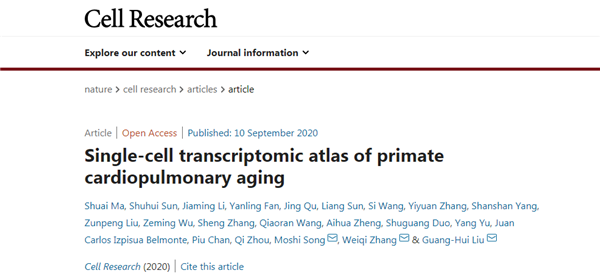Home> News
Chinese researchers reveal vital insights into age-linked susceptibility to SARS-CoV-2
Updated: 2020-09-14

The paper published in the journal Cell Research. [Photo/WeChat account of BSC]
Findings of Chinese researchers in a paper entitled Single-Cell Transcriptomic Atlas of Primate Cardiopulmonary Aging -- published in the journal Cell Research on Sept 10 -- depict the first transcriptomic atlas of the aged primate cardiopulmonary system.
They also provide vital insights into age-linked susceptibility to SARS-CoV-2, according to an announcement on the public WeChat account of Biophysical Society of China, or BSC.
Aging is a major risk factor for many diseases, especially in highly prevalent cardiopulmonary comorbidities and infectious diseases including Coronavirus Disease 2019 (COVID-19). Resolving cellular and molecular mechanisms associated with aging in higher mammals is therefore urgently needed.
In the cooperative research conducted by the Liu Guanghui-led research group and the Song Moshi-led research group from the Institute of Zoology at the Chinese Academy of Sciences (CAS) and Zhang Weiqi-led research group from CAS's Beijing Institute of Genomics, young and old non-human primate single-nucleus/cell transcriptomic atlases of the lung, heart and artery were created -- the top tissues targeted by SARS-CoV-2.
Analysis of cell type-specific aging-associated transcriptional changes revealed increased systemic inflammation and compromised virus defenses as a hallmark of cardiopulmonary aging.
With age, the expression of the SARS-CoV-2 receptor angiotensin-converting enzyme 2 (ACE2) was increased in the pulmonary alveolar epithelial barrier, cardiomyocytes and vascular endothelial cells.
The researchers found that interleukin 7 (IL7) accumulated in aged cardiopulmonary tissues and induced ACE2 expression in human vascular endothelial cells in an NF-κB-dependent manner. Furthermore, treatment with vitamin C blocked IL7-induced ACE2 expression.
Altogether, their findings depict the first transcriptomic atlas of the aged primate cardiopulmonary system. They provide vital insights into age-linked susceptibility to SARS-CoV-2, suggesting that geroprotective strategies may reduce COVID-19 severity in the elderly.
